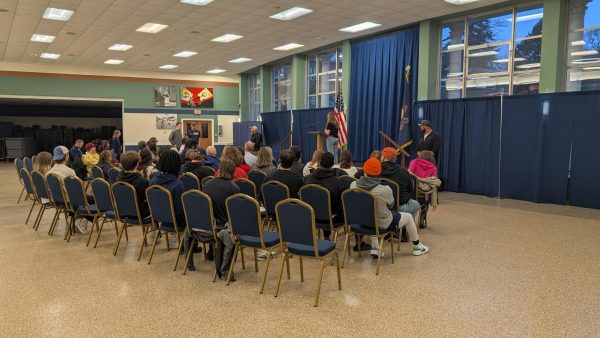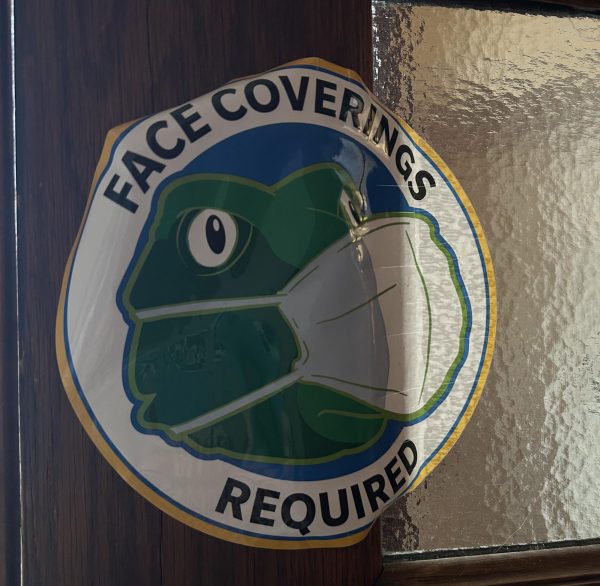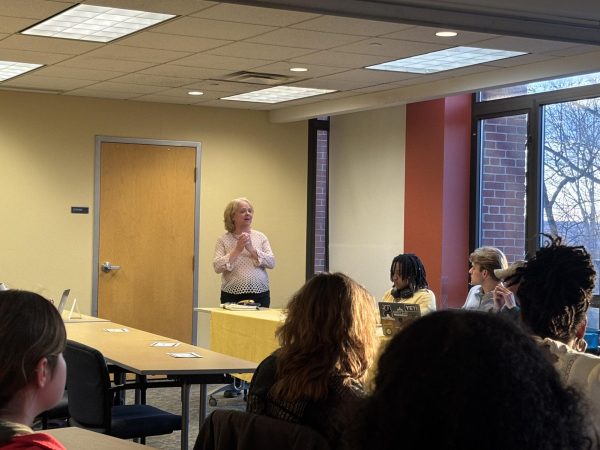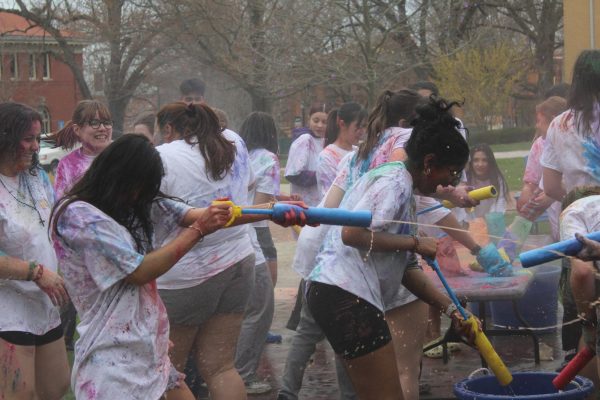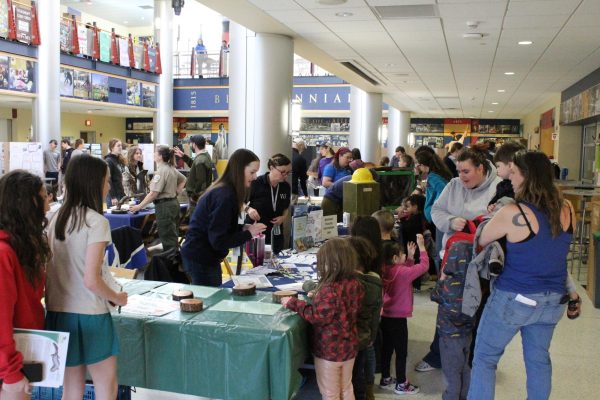Bosnia refugee shares wartime and photojournalism experiences
Dijana Muminovic, freelance photographer, spoke to Associate Professor of Environmental Science Caryl Waggett’s Global Health Transitions class on Thursday, March 3 about her experiences as a refugee and covering refugees in the Middle East. Muminovic came to Allegheny for the fourth annual journalism conference entitled “Welcome the Stranger: Stories of Immigrants and Refugees in the 21st Century.”
Muminovic grew up in Zenica, Bosnia and endured the Bosnian War from ages 12 to 13, often having to seek shelter in her basement after the sirens sounded, alerting citizens when an attack was imminent.
“I was a kid who wanted to play with other kids outside, but that was taken away from me,” Muminovic said. “Everyday I didn’t know if the planes were going to destroy my town or towns next to us. I didn’t know if I was going to find my family and my neighbors alive, if my house was going to be burning. So it was constant fear every single day.”
Muminovic said the sirens went off anywhere from two to ten times each day. Even though Zenica was not the primary target of most attacks, she said they were subjected to constant bombing and airstrikes. However, citizens from other areas would flock to her city and seek refuge in the comparative safety of the city.
It was during this time that Muminovic heard the term “refugee” for the first time, she said in her class presentation. The refugees were often sheltered in her elementary school because it was the only space available.
Muminovic’s family survived the war, but still searched for a way to leave Bosnia because her parents were considered a mixed marriage. Her father was Muslim and her mother was Catholic. It was only after her family moved in with her grandmother that they could find a way to leave Bosnia.
“I didn’t want to leave my grandmother, and my family had given up on their jobs and sold the apartment building we lived in, and we moved in with my grandmother,” Muminovic said.
It was at this point that her family found a sponsor in Croatia, which would be a gateway to the United States. In 1997, her family made the transition to the U.S., settling in Bowling Green, Kentucky, where her family currently lives.
Since her relocation, Muminovic has made many trips back to Bosnia. Two of those trips have been as a photojournalist to cover the aftermath of the Bosnian War from 2009 to 2012.
“In 2010 is when I was documenting the mass graves, [and] the women who are still waiting for their family members to be identified.” Muminovic said.
After receiving her Master of Arts in Visual Communication in 2014, Muminovic went back to Bosnia and the Middle East to cover the refugees passing through Croatia. Muminovic said this trip allowed for her to connect with refugees and portray their story in ways that another photojournalist may not be able to accomplish, as they have not experienced the same things.
After documenting this expedition, Muminovic wrote a story for the Tampa Bay Times entitled “I’m a Refugee,” in which she was able to describe her experiences and the life of current refugees.
“Refugee was that old mattress I slept on my first year in the United States,” Muminovic said in the Tampa Bay Times. “Refugee was the basement I hid in while planes dropped bombs on my town. Refugee was as dirty as my school where refugees slept and, nearly 20 years later, it is as dirty as camp Opatovac in Croatia where I recently witnessed the world’s most recent refugee migration.”
It is after this experience that Muminovic found her way to Allegheny to speak at the journalism conference and to individual classes about her experiences.
Waggett believes that this experience is something that no ordinary classroom could ever convey. Students in Waggett’s class work directly with refugee populations in Erie through service opportunities, but the students are not able to gain the trust needed to speak to the refugees about their experiences in such a short time.
“This allowed our students an insight into the experience they fundamentally cannot get by even working directly in service positions with refugees and they certainly can’t get from the books,” Waggett said.
The students in the class were able to hear Muminovic’s point of view and refugees facing relocation, border crossings and the difficulty of trying to leave the country from which they are seeking refuge.
“Dijana recognized it takes a very deliberate decision to be able to talk about and reflect upon the experience of being a refugee,” Waggett said. “From our perception, from people trying to learn about being a refugee, it takes a lot of courage and willingness to share and be open and vulnerable and that was a huge part of what the students were able to get out of interacting with Dijana.”
From a student perspective, this allowed for a deeper understanding of the material that has been taught in class or learned through videos and textbooks.
For Danielle Zehnder, ’18, this talk allowed her to see the things she has learned about from a different perspective.
“I think a lot of the times, being an outsider looking in, you lose a lot of it, and this kind of humanizes situations,” Zehnder said. “It makes us see it from a different light. By having her come, a lot of people will have a better understanding and compassion.”
The students in the class will begin working with the refugee population in Erie beginning the week of March 7. Jonah Raether, ’18 , believes this talk with Muminovic will allow him and his peers to better understand what the refugees are experiencing.
“It makes me aware that not everyone will be as open to talk about their experiences as Dijana was,” Raether said.





